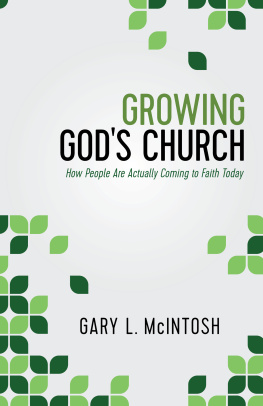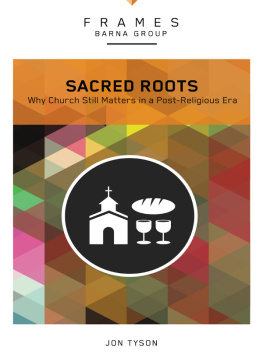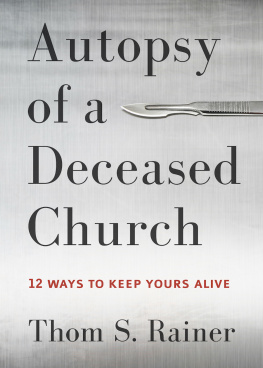PROLOGUE
SOMETHING BETTER
E very advancement in the way people live has come about because someone saw what could be and was no longer willing to accept what is. This is true of virtually all the inventions that have impacted human civilization. The men and women responsible for those breakthroughs imagined something that was not yet visible to the human eye. Not all of these people were geniuses, but they all had vision. They refused to yield to the idea that there was no better way to do things and pressed on toward something better, even though the process often required years of hard work and many failures along the way. Consequently, countless people in succeeding generations have reaped the benefits.
The starting point for this advancement was people who did not settle for the status quo but believed that things could be different and better. This fact is just as true in the spiritual realm. Every revival in church history has been started by pastors and believers who became deeply dissatisfied with the moral and spiritual climate around them. They knew from Scripture that God had something better for his people. All the great missionary movements have been spawned by men and women who became desperate to see Gods kingdom extended to new regions and to those who had not yet heard about Jesus. In fact, every time people really pray, they are believing that God by his divine power can change what is into something better.
The Bible is full of declarations about Gods desire to bring about dramatic change when his children are missing out on his promised blessings. In the Old Testament, Gods ability to overcome all obstacles and help his people is illustrated time and time again through individuals such as Abraham, Joseph, Moses, and David. They stand out, along with a few others, as exceptions to the general hard-heartedness and unbelief that existed among the children of Israel.
In the New Testament, however, the focus changes to the churches of the Lord Jesus Christ and the ministers who serve within them. Starting with the birth of the church in Jerusalem (Acts 2), the gospel is preached, lives are transformed by the Holy Spirits power, and a congregation is formed as shepherds are carefully placed over Gods flock. This same spiritual sequence is repeated in city after city. Through these local churches filled with spiritually transformed people, God works further change in ever-widening circles throughout the world. The book of Acts recounts these wonderful stories as the Lords message and power spread throughout the Roman Empire.
Even though individual lives are being changed by the power of the gospel, Gods special concern is always focused on the local churches that spread his gospel and disciple new converts. In fact, the New Testament is composed mostly of letters sent to these local assemblies or to the ministers who exercised spiritual leadership among them. Jesus himself wrote seven letters to different local congregations (Revelation 2-3) and was seen walking among them as their resurrected Lord (Revelation 1:13). It is evident that nothing is more important to the Lord than the spiritual state of the local churches that bear his name.
Heavens great concern is not for the United Nations, global warming, or the financial markets of the world. Heavens great concern is for the extension of Gods kingdom, the spreading of the gospel, the world coming to understand who he really isand all of this depends on local Christian churches like yours and mine. God is not using angels to represent himself, nor will a voice be heard from heaven to preach the gospel. He has chosen to work here on earth through his church.
Obviously, not all Christian churches are in a healthy spiritual condition, and therein lies a great problem. Some churches are worldly, mere infants in Christ that are not ready for solid spiritual food (1 Corinthians 3:1-2). Others are susceptible to a false gospel, which is no gospel at all (Galatians 1:6-7). Some congregations have been placed in hostile spiritual territoryeven where Satan has his throneyet they remain true to Christ (Revelation 2:13). Others have lost their first love of Christ and need to repent quickly (Revelation 2:4-5). Some stand as models to believers every where because of their strong faith in God (1 Thessalonians 1:7-8). Still others are so complacent and lukewarm that Jesus is about to spit them out of his mouth (Revelation 3:16-17).
But the Bible is always reminding us that things dont have to remain the way they are. If God is given the opportunity, his blessings can bring about dramatic change no matter what our circumstances are. No negative situation, hostile environment, or shortage of manpower is greater than the power of Jesus Christ. He alone can transform any local congregation into something more wonderful than we could ever imagine.
Even in his letter to the church that was at risk of being vomited out of his mouth, Jesus closed by exclaiming, Here I am! I stand at the door and knock. If anyone hears my voice and opens the door, I will come in and eat with him, and he with me (Revelation 3:20). How tender and compassionate our Lord is in wanting to heal the worst of our church situations! He desires the best for our churches so that his name will be honored and the world will be affected by his message going out through strong and vibrant believers. Who else can God use but his own church? And we alone can make the decision to open the door to our Lord.
We who consider ourselves serious believers in Christ have to face this obvious question: Will we settle for the status quo in our own church situations, or will we reach out for what God can supernaturally do? The Lord is eager to make spiritual changes among us and shower us with his blessings. He wants ushis peopleto experience the greatness of his power and the depth of his love in a new way. All he needs from us is a listening ear and a heart that believes that with God all things are possible.
ONE
THE BABY UNDER ATTACK
C arol and I have often read the Christmas story in Matthew 2, which includes King Herods vicious attack on the babies of Bethlehem in his efforts to seek and destroy Jesus, the newborn King. From this story we thought we understood that Satan often attacks the baby when it is young and vulnerable. Through the experiences of others we had learned that when a new ministry for Christ begins or when someone steps out in faith to do Gods will, Satan will often try to squelch what God is doing right at the outsetbefore it gathers momentum and builds a stronger faith.
As we began our ministry at the Brooklyn Tabernacle, we both thought we understood and were prepared for Satans attacks. We were (and still are) hungry to be like the early Christians who so powerfully experienced the Lords hand on their lives. Carol and I wanted the Brooklyn Tabernacle to be a place where Gods grace would be clearly evident and not just talked about. But soon we learned just how intense it can get when the baby is under attack.
The story of this satanic attack actually begins with some precious verses in the New Testament that God used in a tremendous way in my life. They paint a beautiful picture of the church God blesses:
Now those [Christians] who had been scattered by the persecution in connection with Stephen traveled as far as Phoenicia, Cyprus and Antioch, telling the message only to Jews. Some of them, however, men from Cyprus and Cyrene, went to Antioch and began to speak to Greeks also, telling them the good news about the Lord Jesus. The Lords hand was with them, and a great number of people believed and turned to the Lord (Acts 11:19-21).
















